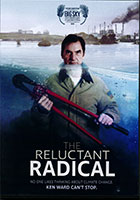
The Reluctant Radical 2017
Distributed by Collective Eye Films, 1315 SE 20th Ave. #3, Portland OR 97214; 971-236-2056
Produced by Lindsey Grayzel, Deia Schlosberg
Directed by Lindsey Grayzel
DVD, color, 77 min.
College - General Adult
Activism, Climate Change, Ecology, Environmental Education, Environmental Justice, Environmental Protection, Environmentalism, Ethics, Global Warming, Protest Culture and Society, Social Movements
Date Entered: 06/11/2018
Reviewed by Erin Rowley, University at Buffalo LibrariesWhat would you do to stop a monumental disaster from occurring? Would you commit a crime? If so, is that crime justified? Even forgivable? These are the questions that are central to the documentary, The Reluctant Radical, which follows said reluctant radical, Ken Ward, an environmental activist. Ward states early on in the film that he doesn’t want to have to be a radical for environmental awareness, specifically concerning climate change, but as a father he feels an obligation to do something.
The film shadows Ward as he engages in peaceful protests with the aim of doing whatever is humanly possible, for one person, to stop the actions of big business that are harming the environment. He attempts to block boats headed to the ice caps to drill for oil, to stop the delivery of coal to power plants, even stands in front of gas stations with signs declaring them to be evil. His actions land him in jail on more than one occasion, with one especially significant event resulting in a felony charge and a criminal trial.
Climate change can be an uncomfortable topic to discuss, regardless of your personal feelings on the issue. Scientific data, some of which is included in the film, continually substantiates the claim that climate change is happening and human actions are a contributing factor. Yet, many feel helpless when it comes to stopping it. Ward and the film show how one person can act. The activism does not always result in change. However as Ward states, “direct action creates points of moral clarity and conflict. It forces people to take sides. We need moral clarity, for sides to be drawn.”
Overall this film is recommended. It creates an urgency for the viewer, for a crisis that may impact all of humankind, if not dealt with properly. The film is deeply personal, passionate, and could very well be inspiring to many.
While the film itself is not rated, it does contain strong language throughout. Therefore, especially considering a potential classroom setting, it would be best for audiences college-aged to adult. It could potentially be used as recommended viewing for class. It is also a film that is sure to be enjoyed by those who are interested in or support environmental activism.